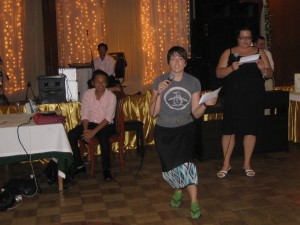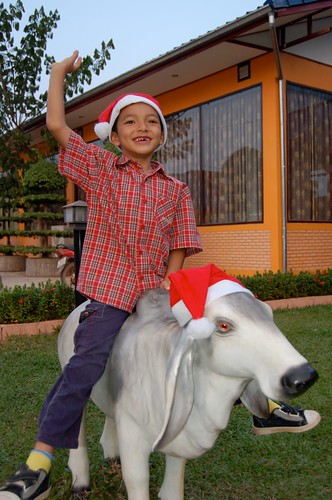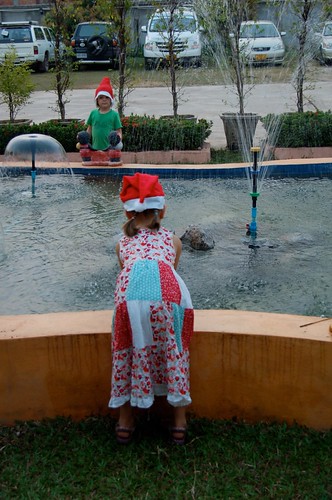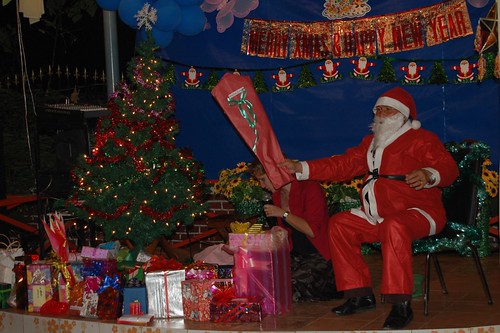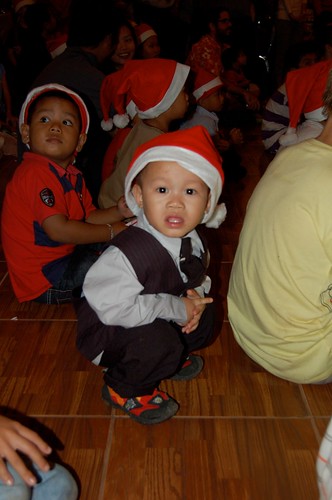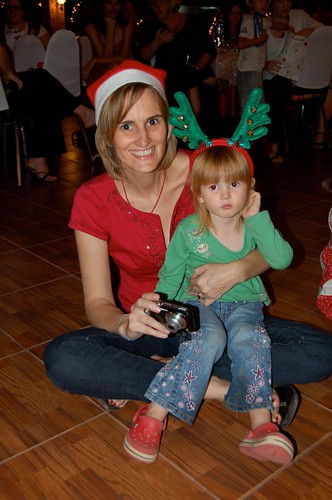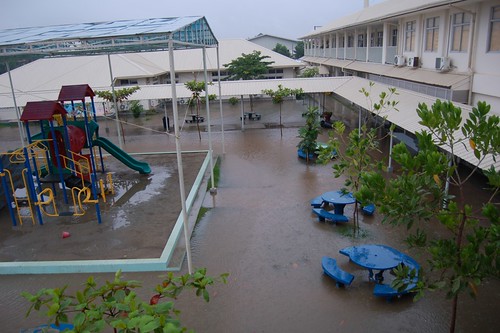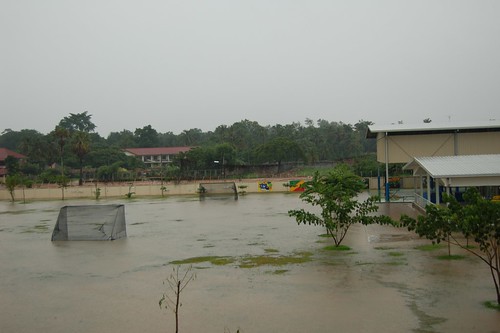I am wayyyyy behind on blogging. Here’s my final post about Laos (unless I get overcome by another wave of nostalgia).
Tag Archives: VIS
Farewell from friends makes my heart sing
Our school’s end-of-year party generally features a buffet dinner, a little entertainment and formal farewells to the departing staff. As one of the those departing staff members this year, I was dreading a sappy send-off. Usually I love being the center of attention, but not when the situation turns me into a blithering idiot. (The potential is always there, I know, but good-byes are particularly tricky.)
So when the farewells got under way at our party Saturday night, I tried to keep my mind otherwise occupied with catty remarks to my table mates, snuggles with a friend’s baby, and a trip to the bathroom. Another departing teacher, Terese, had a teary moment with the microphone that nearly broke my own emotional dam, but I held it together. Soon my picture popped up on the screen, and I knew there was no avoiding it. However, instead of the usual videotaped comments from friends and colleagues, my special GFs Carol and Nikki took the mics and announced they had a live farewell for Tony and me.
I quickly dashed back to my seat for the surprise performance. As the first notes of “Hotel California” floated from the speakers, I clapped with anticipation. That’s one of my signature karaoke numbers, which I have sung (badly) at many local restaurants and parties. I thought it would be a fitting final tribute, but no, it was even better than that. With the help of accomplished songstress Candice Broom, they had written new lyrics full of references to life here in Laos, special moments we’ve shared in Vientiane and plenty of inside jokes. They knew exactly what I needed: love and laughs, free of sob-inducing gushiness.
I was too thrilled and stunned to think of picking up my camera, but Tony took this photo. If I find out someone filmed it, I’ll post the video later.
Here are the lyrics:
Pinky Beef Pot (sung to the tune of Hotel California)
On a small lonely campus, humid breeze in my hair,
Warm smell of shrimp paste, rising up through the air.
Up ahead in the distance I saw a shimmering Wat.
My head grew sweaty and my clothes grew wet,
Thanks god I got my shot.
The students entered the doorway, I heard the late bell.
Then I was thinking to myself this could be Heaven or this could be Hell.
While I sipped on a Diet Coke, and tried to show them the way,
There were voices throughout the town; I thought I heard them say,
“Saibaidee to the restaurant Pinky Beef Pot
Such a lovely place
(Such a lovely place)
Such a lovely taste
Living it up at the restaurant Pinky Beef Pot
Organ meats and beer
(Organ meats and beer)
You can find it here.”
Her mind is PYP twisted, he’s got the DP bends.
They’re praying that India puts them on the financial mend.
Oh the noise in the courtyard, hide under the ‘squito net.
Some things you want to remember, some you have to forget.
So I called to the mei baan, “Please bring me my wine.”
The students make me so tired I go to sleep before 9.
And still mortgages are calling from far away,
Wake you up in the middle of the night just to hear them say,
“Lar con to the restaurant Pinky Beef Pot
Such a lovely place
(Such a lovely place)
Such a lovely taste
No more family nights at Pinky Beef Pot
What a nice surprise
(What a nice surprise)
Just wish they had French fries.”
Now, here it is again with explanatory notes and shameless plugs for old blog posts.
Pinky Beef Pot (sung to the tune of Hotel California)
On a small lonely campus (Vientiane International School), humid breeze in my hair.
Warm smell of shrimp paste (Southeast Asian staple ingredient), rising up through the air.
Up ahead in the distance I saw a shimmering Wat (that’s Lao for “temple,” and there’s one on every corner – see my Wat ‘O’ the Week posts).
My head grew sweaty (reference to the scorching heat) and my clothes grew wet (reference to the Pii Mai holiday, when the monks doused me with a hose – see the blog post Wat Watnak – or should I say “Wet” Watnak?),
Thanks god (we picked up the extra “s” from the Turks when we lived in Istanbul) I got my shot.
The students entered the doorway, I heard the late bell.
Then I was thinking to myself this could be Heaven or this could be Hell.
While I sipped on a Diet Coke (Tony’s cocktail of choice), and tried to show them the way,
There were voices throughout the town; I thought I heard them say,
“Saibaidee (“hello” in Lao) to the restaurant Pinky Beef Pot (one of our favorite Family Night destinations – see the blog post, Family Night – Pinky Beef Pot)
Such a lovely place
(Such a lovely place)
Such a lovely taste
Living it up at the restaurant Pinky Beef Pot
Organ meats and beer (self-explanatory, no?)
(Organ meats and beer)
You can find it here.”
Her mind is PYP twisted (Primary Years Programme – the convoluted elementary school curriculum framework of the International Baccalaureate Organization), he’s got the DP bends (Diploma Programme – the International Baccalaureate’s curriculum for grades 11 and 12).
They’re praying that India puts them on the financial mend (our new jobs at the American Embassy School in New Delhi, India, come with a big pay raise! Wahoo!).
Oh the noise in the courtyard, hide under the ‘squito net (don’t mess with Dengue Fever).
Some things you want to remember, some you have to forget.
So I called to the mei baan (Lao for “housekeeper,” although ours has never actually brought me a drink of any kind), “Please bring me my wine.”
The students make me so tired I go to sleep before 9 (true dat).
And still mortgages are calling from far away (investing in one of the most oppressed cities in the U.S. might not have been our most fiscally responsible decision … just sayin’),
Wake you up in the middle of the night just to hear them say,
“Lar con (“good-bye” in Lao) to the restaurant Pinky Beef Pot
Such a lovely place
(Such a lovely place)
Such a lovely taste
No more family nights at Pinky Beef Pot
What a nice surprise
(What a nice surprise)
Just wish they had French fries. (I loves me some French fries!)“
Have yourself a merry Lao Christmas
Whenever I reminisce about Christmas in Laos, specific images will dance in my head: pink butterflies, a water buffalo in a Santa hat, children doing the limbo, and perhaps best of all, our school’s tae kwondo instructor in the role of Santa.
These images come not from drug-induced dreams but from last night’s VIS Family Christmas Party. School staff members and their families ate, danced, sang karaoke, and enjoyed the spirit of the season. Whether or not they celebrate Christmas, everyone looks forward to the month-long break starting in a week. The end-of-semester feelings of relief, anticipation and joy permeated the crowd.
As a member of the Social Committee, I showed up early at the open-air Long Loerth Restaurant, which was already strung with thousands of twinkly lights. (You know I’m a sucker for twinkly lights.)
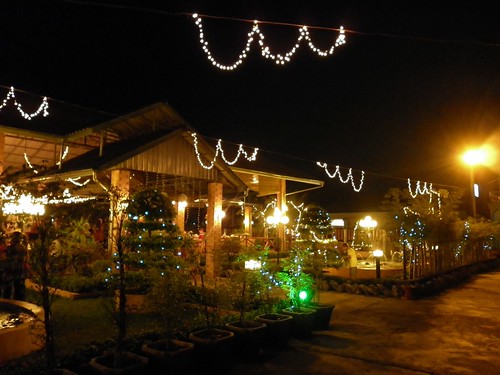
Apparently a wedding had taken place earlier in the week, so rather than take down the pink butterflies, interlocking hearts, vases of fake flowers, blue-and-white balloons, and yellow photo backdrops, we just decorated around them.
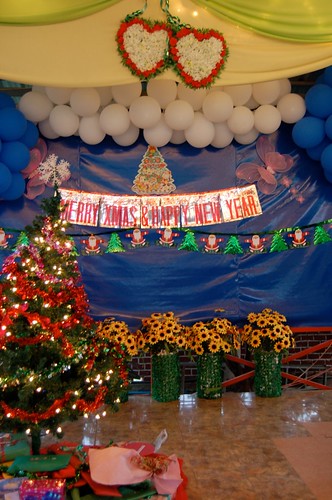
The restaurant featured a spacious garden with two fountains and an odd collection of statuary, which provided a fun play area for the children (who all got Santa hats as party favors).
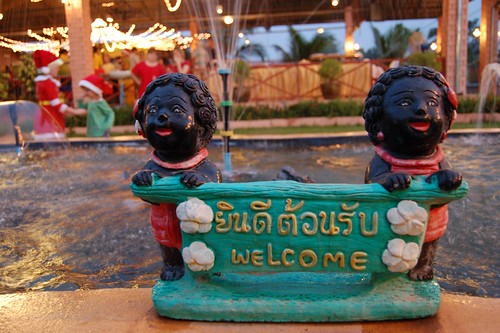
The evening started with games for children – musical chairs, limbo, and freeze dance – led by my beautiful friend, Lae (in the long striped dress).
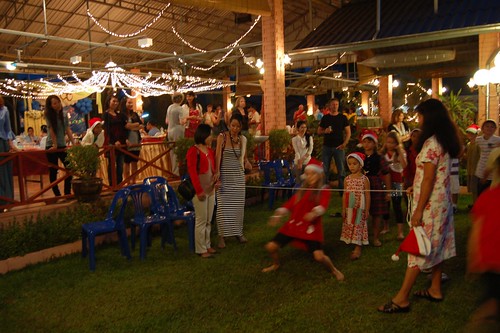
After dinner, I called all the youngsters back inside and asked, “Guess who’s coming?!” They quickly gathered in front of the stage to wait for Santa’s entrance. Not quite sure where he was, I tried to distract the kids by making them sing “Jingle Bells” and then copying my Santa calls. “Oh, Saaaanta, where aaaare you?” and such.
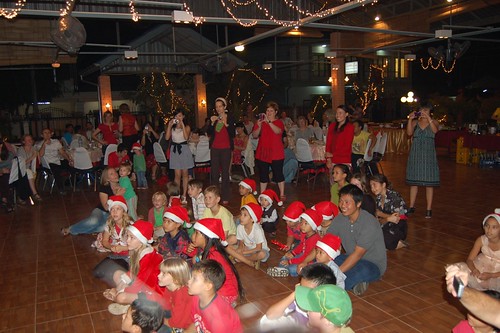
Suddenly, Master (hmmm… I don’t know his real name…) appeared at the restaurant’s entrance and dramatically worked his way to his impatient little flock, stopping to give hugs and handshakes and to scoop up and spin unsuspecting spectators. Finally, he reached the stage and began passing out presents. The Social Committee had shopped for all 57 children in attendance, and the adults’ Secret Santa gifts were also under the Christmas tree. Master did little to speed up the process. Each recipient received a sweaty kiss on the cheek, a gentle tae kwondo punch, a surprising hoist under the armpits for a quick toss into the air, or at the very least, a loud announcement of his or her name with an enthusiastic pat on the back.
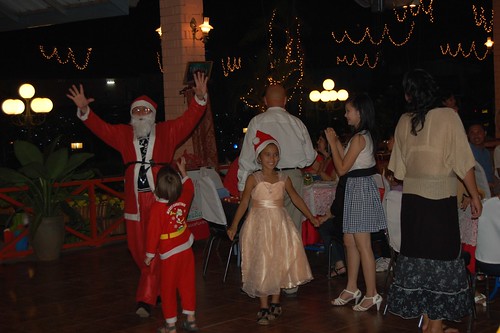
Master got a surprise of his own when Nikki strolled to the stage to claim her gift and planted a big kiss on his mouth.
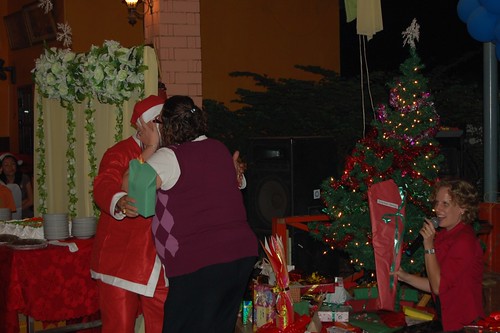
Lae and I invited everyone to take a Christmas cracker, but Lae didn’t know how to say “cracker” in Lao, so we decided in was “cracKERRRR.”
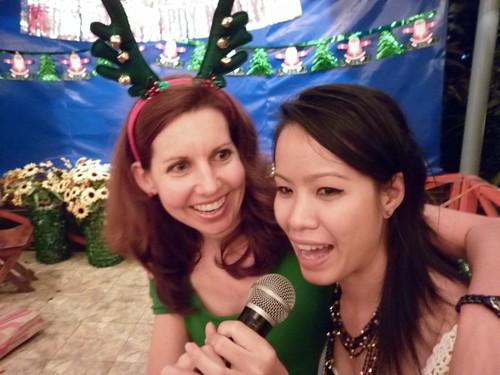
Eventually, we unplugged my iPod (which played Christmas music for most of the night) and turned on Lae’s dance party tunes.

One of my favorite parts of the evening was seeing our school’s security guards, cleaning ladies, gardeners, and handymen out of uniform and surrounded by their beloved families. Greeting their spouses, meeting their children, playing with their babies, I felt the language barrier disappear.
Seriously, who’s to say that pink butterflies don’t have a place at Christmas?
Flash Flood Freakiness
As we wrapped up our first week back at school, I was feeling neglectful of The Guide Hog but too busy to do anything blog-worthy. And then Mother Nature handed me a story.
Rain pounded Vientiane overnight, but that’s nothing new in this wet season. As we headed out the door for school this morning in the deluge, I donned my water-resistant ride-to-school pants, purple plastic poncho and polka-dotted gumboots and then climbed on back of Tony’s motorbike. I prefer to hitch a ride rather than pedal on days like this.
When we arrived at school, we parked the bike and walked toward our classrooms. Nothing seemed out of the ordinary until we turned the corner around the administration building. The whole field and playground area had transformed into a lake. My first thought was, “Rain day!” But then I remembered where I was. If we canceled classes for every downpour, we’d have to teach all summer to make up the missed time. No thanks.
I often work with small groups at these outdoor tables, but unfortunately, none of the children came to school in hip waders today.
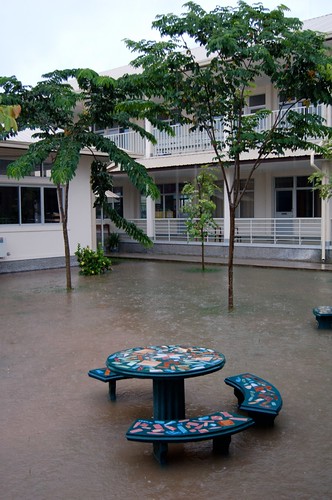
I had supervision duty here at break time, but my main job today was to tell kids, “Don’t even think about it!” To make up for the playground prohibition, I taught them how to play “Red Light-Green Light” on the sidewalk. That was a surprisingly big hit.

The hallways in the secondary building were literally crawling with every little creature seeking refuge from the flood – spiders, roaches, crickets, beetles, frogs, snakes, snails, you name it.
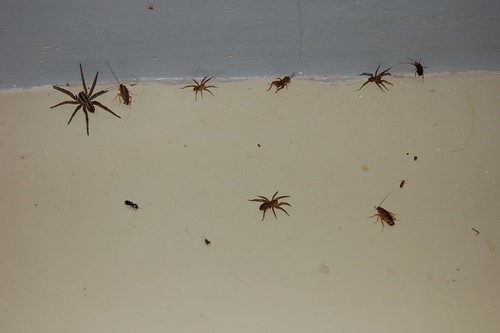
Many of us felt disconcerted that our 2-year-old campus could experience such terrible flooding problems. We worried that a poorly designed drainage system might lead to weeks of indoor recess (every teacher’s nightmare). We wondered if the land would eventually return to its previous incarnation as a rice paddy. Our new director asked if I knew what a cubit was in case we had to build an ark. (I didn’t.)
Luckily, our facilities manager, a spunky Thai woman named Ben, found the source of the problem. She borrowed my boots, waded into the flood water, and discovered the school’s drainage system worked perfectly to channel the water off campus and into large ditches. Ben also discovered that the pooled water in the ditches was a popular fishing spot for village children. When the heavy rains and flood run-off created a strong current in the ditches, the children used their problem-solving skills and built a dam, effectively trapping the fish and flooding our campus.
After Ben dismantled the dam (and survived an encounter with a large eel), the water and the drama quickly ebbed.
Sok dee pii mai!
Pii Mai (Lao New Year) is next week, and Vientiane is getting ready. Today our school held an assembly to mark the occasion.
I had noticed Hawaiian luau-style shirts for sale all over town lately, and I just figured they were hot with the tourists. Fortunately, my Lao colleagues set me straight: Flowers play a major role in celebrating Pii Mai (pronounced Pee My), so floral tops are de rigeur.
While running some errands on my bike, I stopped at a roadside stand and bought one for about $3.50. The guy looked me over and recommended an XL, but I grabbed a bright orange man’s style in a size large. Later, Tony bought one for himself, but his blue-and-white shirt was a size medium. It was even too small for me! Why, oh why, won’t men try on clothes before buying them? But I digress … At school today, he traded with my friend, Whetu, whose shirt was too big, so he and I both ended up in orange as though we’d planned it.
How cute are we?

The floral shirts definitely brightened up the school today. I especially loved the little boys who wore matching flowery shorts.
Our assembly included explanations and dramatizations of the Pii Mai traditions, music, a demonstration of water blessings and finally a big circle dance (although the clueless falang turned it into more of a dreamy mosh pit).
Afterwards, classes met on the lawn, where students blessed their teachers and asked for forgiveness. Isn’t that a fantastic tradition? Children dipped a small cup into a large silver bowl to scoop out some water and flower petals. They poured a little water on their teacher’s hands or neck and said, “Sok dee pii mai!” (Happy New Year!) and offered other good wishes. The teacher then used his or her wet hands to sprinkle some water back on the student. Because I’m not a grade-level teacher, I didn’t have a designated spot, but many of my students called me over to receive their blessing. It was really beautiful. I expected the children to get wild and silly with the water, but they were shockingly respectful.
A few shots from the assembly:
Out on the grass, we all participated in the water blessings.
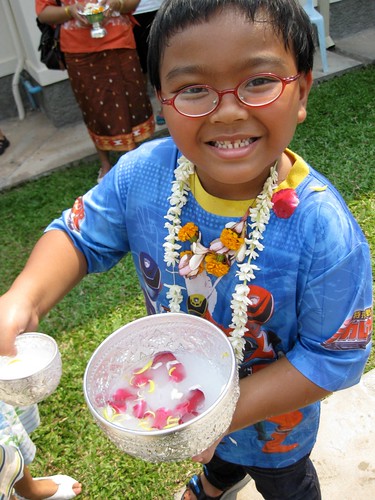
Here are some details about the Pii Mai holiday lifted from Wikipedia. According to our Lao staff, this is pretty accurate:
Water is used for washing homes, Buddha images, monks, and soaking friends and passers-by. Students first respectfully pour water on their elders, then monks for blessings of long life and peace, and last of all they throw water each other. The water is perfumed with flowers or natural perfumes. The idea of watering came from the legend of King Kabinlaphom, whose seven daughters kept his severed head in a cave. The daughters would visit their father’s head every year and perform a ritual to bring happiness and good weather.
Sand is brought to the temple grounds and is made into stupas or mounds, then decorated before being given to the monks as a way of making merit. There are two ways to make the sand stupas. One way is to go to the beach, and the other way is to bring sand to the wat, or pagoda. Sand stupas are decorated with flags, flowers, white lines, and splashed with perfumed water. Sand stupas symbolize the mountain, Phoukao Kailat, where King Kabinlaphom’s head was kept by his seven daughters.
Another way to make merit at this time is to set animals free. The Lao believe that even animals need to be free. The most commonly freed animals are tortoises, fish, crabs, birds, eels, and other small animals.
Flowers are gathered to decorate Buddha images. In the afternoons people collect fresh flowers. Senior monks take the younger monks to a garden filled with flowers, where they pick flowers and bring back to the wat to wash. People who didn’t participate in the flower picking bring baskets to wash the flowers so the flowers can shine with the Buddha statues.
There is an annual beauty pageant in Luang Prabang to crown Miss Bpee Mai Lao (Miss Lao New Year). There are many beauty pageants in Laos, but Luang Prabang – the old capital – is widely known for its Nangsoukhane pageant. There are seven contestants, each one symbolizing one of King Kabinlaphom’s seven daughters.
During Lao New Year, there are many spectacles including traditional Lao music, mor-lam, and ram-wong (circle dancing). During the daytime almost everybody is at the temple worshipping, hoping to have a healthier and happier life in the new year. During the evening, people of all ages go to the wat for entertainment.
VIS Christmas Party
Saturday night, we celebrated Christmas with our Vientiane International School friends at The Jukebox, an open-air pub owned by an American teacher and his Lao wife. I served on the organizing committee, but I didn’t do much (other than work with another teacher to compile a music playlist).
Everything was fabulous! Lovely decorations, delicious food, a bit of dancing, and lots of fun conversations. The highlight may have been Santa Claus, the school’s tae kwondo instructor, who passed out presents and thoroughly entertained us.
There’s a Light at the End of the Semester
As a teacher of English to kids who don’t speak English, I spend much of my time waving around flashcards, overenunciating vocabulary words, leading youngsters through silly songs with repetitive lyrics and actions, and contorting my face and body in ways that help communicate the mysterious language.
I can’t say the word “book” without automatically putting my hands together as in prayer and then opening them up to read the story. I can’t talk about an abstract concept without automatically reaching for a marker to sketch a clarifying illustration on the board.
On a good day, a student will poke me, point out the window, and say, “Sun!”
“Yes, it’s a beautiful sunny day!” I’ll exclaim. “Is it raining today? Nooooo! Is it snowing? Nooooo! It’s sunny! Good job! Did everyone hear Jenny tell us about the weather? She said it’s sunny! Super!”
On a bad day, I’ll ask, “How’s the weather today?” Some poor kid will answer, “Sun!” and then I might possibly have a total meltdown.
“No! We don’t say the weather is SUN! We say ‘It’s sunny!’ I have told you that a million freakin’ times! ‘Sun’ is a noun. ‘Sunny’ is an adjective. Geez, have I taught you NOTHING?!”
Of course, I don’t really say that stuff out loud. But I do think it. A lot. Especially in that first semester of the school year when progress … seems … so … slow.
I just get impatient. I want them to hurry up and learn English so they can change their social outcast status, participate in class discussions and milk every drop of discovery that school has to offer them. Language researchers have repeatedly found that fluency might elude a student for up to seven years, and it’s totally normal for a child to experience a lengthy “silent period,” during which he or she won’t utter a single English syllable. Every so often in those first few months of the school year, I temporarily reject research and its accompanying logic, and I feel compelled to throw a little mental temper tantrum at the mind-numbing pace of language acquisition.
Right about now, however, as the first semester is winding down, there’s a sudden dearth of those cerebral hissy fits. Instead, I can’t help but notice how terribly brilliant all my students are! My eyes, more often than not, widen in admiration rather than roll in frustration when a child answers a question or shares an idea. Sometimes I even find myself asking a question with my back turned to the group, and students actually ANSWER – even though they can’t see my facial expressions, read my lips or take cues from a gesture. It’s like the English Fairy waved her magic wand, sprinkling comprehension dust over all their little heads.
Today, I was teaching some words for food and drinks to a group of English beginners. When I held up the flashcard for coffee, I said, “I like drinking coffee!” Then I grasped the flashcard in a passionate embrace and said, “I LOVE drinking coffee!” Fidgety giggles ensued.
“Do YOU like drinking coffee?” I asked.
Correct answers included (a) I like drinking coffee, (b) I don’t like drinking coffee, or (c) a simple thumbs up or thumbs down to show understanding. To my surprise, one excruciatingly shy second grader popped out of her seat and said, “I don’t like drinking coffee, but my mother and father like drinking coffee.” She didn’t pronounce any ending sounds, but it didn’t matter. She spoke!
At that moment, I heard angels singing and I couldn’t stop myself from giving her a big weepy hug. (Yes, I know I could get arrested for that in America, but such things are still OK in the holistic international teaching world.)
Another end-of-semester triumph occurred in a first-grade classroom earlier this week. I was providing “in-class support” during Miss Jill’s writing lesson, so I sat with a little Vietnamese boy who didn’t speak a lick of English four months ago. First, he drew a picture filled with aggression, complete with ninja warriors and weapons of mass destruction. Next, he told me what was in the picture: good boy, bad boy, fighting, shooting. He didn’t know the words for “tank” or “bullets” or “strong,” so I explained them and helped to label his picture.
Then he told me the story, and I dictated it back, showing him how to link together the “sight words” he already knew with the labeled picture so he could write his exciting action story.
And he did. Here it is.
While we worked, I felt a pang of guilt for teaching this child the vocabulary of violence. On the other hand, who am I to deprive a little boy from writing about what interests him most? Last year, visiting author Ralph Fletcher told our Shanghai American School staff that boys WILL write violent stories, and teachers must give them some artistic freedom and validation of their ideas. I agree.
Even more than Ralph Fletcher’s approval, though, I found reassurance in the big smile that stretched across my student’s face as he read his own writing out loud over and over again.
In that smile, I also found a little reminder of why I love teaching English as a Second Language: Sure, the school year – especially the first semester – is filled with moments of agonizing self-doubt and sleepless nights as I stress about children spending their days bombarded by meaningless sounds and texts. Lucky for me, I get to collaborate with talented classroom teachers, who create a safe, supportive, language-rich environment for those English learners. And best of all, I get to witness the proud grins when those sounds suddenly make sense, those texts reveal facts and fairy tales, and that alphabet offers the power – real POWER – to share thoughts, experiences and make-believe with other people who also understand this crazy language!
Taste of Laos
When the lunch bell rings at school, Tony and I usually eat leftovers from the previous night’s dinner or we purchase meals from our canteen, which is operated by a local restaurant owner. Recently, the VIS receptionist, Paramy, started providing lunches prepared by her husband and delivered to school – at a third of the canteen’s price.
Yesterday, we had a special treat. Paramy’s mother made our lunch!
“This is real Lao food,” Paramy said. She pulled off the soup pot’s lid to expose clear broth with pale green chunks. “That’s baby cantaloupe soup,” she said. (Actually, she said “cantalook,” but we eventually figured out what she meant.)
Then she handed me a little tub of steamed rice with a banana leaf packet on top.
She removed the toothpick holding the packet together, unfolded the banana leaf and pointed to the contents. “This is a flower from the south of Laos,” she said, explaining that the flower comes from the Dok Khae tree in the rainforest. Her mom spotted these at a market and decided to prepare today’s delicacy.
Minced pork, bits of fish and delicious spices were stuffed into each blossom, and then the whole packet was steamed. The flower itself had a slightly bitter taste, but a few drops of chili sauce gave the dish a fiery kick.
Paramy claims the Dok Khae tree has many medicinal benefits. If I understood her correctly, the flower helps to regulate your metabolism.
As I noshed on Mok Dok Khae and chatted with my Lao and foreign colleagues, I had to smile. You can’t get much more authentic than a Lao mom whipping up lunch in her own kitchen.
Anticlimactic Halloween
On this day at schools around the world, children dressed in costumes and celebrated Halloween. Last year, our whole ESOL department at Shanghai American School dressed as pirates. Here we are in all our swashbuckling glory:
This year, at my new school, I was the lone pirate. In fact, I was the only person – child or adult – who dressed up. I knew there wouldn’t be a parade or a party, but I just couldn’t let this most awesome holiday pass without digging into my costume box. I had lunch recess supervision duty at the basketball court, and I’d like to say the kids gathered ‘round and expressed their admiration for my unique form of individuality. In reality, they made fun of my “parrot,” a silver-sequined Christmas ornament that I wired to my shoulder seam, and tried to steal my plastic sword.
Not one to shy from the spotlight, I enjoyed all the stares and comments from kids, parents and other teachers. However, I felt a bit deflated in the cafeteria when a European teacher said in a rather surly voice, “That’s so AMERICAN.”
I wanted to respond with (ahem … cue the patriotic music, please), “Madam, if you are suggesting that my country has overpromoted this great holiday – a holiday that allows people of all shapes and sizes a reprieve from calorie counting and stress-related eating disorders … a holiday that fills our plastic pumpkins with unconditional joy … a holiday that gives ordinary citizens the freedom to dress in their most shocking, funny or slutty frocks … a holiday that cares not about religious affiliation, sexual orientation or political parties but only about uncensored silliness – if you are suggesting that my country has helped millions of people around the world discover the innocent chewy goodness of candy corn, the eerie yet satisfying glow of a jack-o-lantern at night, the ability of peeled grapes and cold wet spaghetti to trick unsuspecting haunted house guests, and the pheromonal qualities of a tight black cat costume … if you are implying that the United States is single-handedly responsible for the globalization of Halloween, well, then madam, I can only say I AM PROUD TO BE AN AMERICAN!”
Instead, I lifted my eye patch and said with a whine, “This school is so LAME.”
International Day
At a school where …
• one second-grade class comprises 12 nationalities,
• many kids speak a different language with Dad than they do with Mom,
• the elementary teaching staff represents 5 continents,
• even the native English speakers get confused by each other’s accents, and
• an impromptu lesson about an insect in the room turns into a discussion of how to cook it …
EVERY day is International Day.
However, one day each year is set aside to celebrate the myriad cultures represented by our student body. At VIS, that day was Friday. Dressed in their traditional costumes, children puffed up with pride for their home countries and paraded around the school grounds. The younger group spent the morning in sessions that explored dance as a form of cultural expression, and then they joined the secondary students for an assembly at the covered basketball court. Student performances included a spectacular Bollywood-ish dance by two sisters from India, a poignant interpretive dance by a Nepalese girl, a silly crowd pleaser by the 8th grade class (“Did You Ever See a Penguin Come to Tea?”) that got the crowd up out of their seats, and a rap version of Frere Jacque by the middle school French class. A local Lao hip-hop dance troupe had everyone clapping and cheering.
The highlight of the day was lunch! Nearly every family contributed a dish from their home country, so the tables overflowed with delectable treats. I’m not sure exactly what I ate, but everything was scrumptious. Just when things were wrapping up, a German dad passed around some apfelkuchen. Mmmm … schmekt gut!
As an American, it’s always a little tricky to come up with a costume on International Day. One of my students said, “You could dress like the Green Lady.” I thought he meant a superhero like the Green Lantern or the Green Hornet, but eventually he struck a pose and I realized he meant the Statue of Liberty. Another student told me to dress like Uncle Sam. Instead I opted for a red, white and blue ensemble with some silver stars on my face. Those savvy little kids know their flags. “You could be from Australia! Or Burma! Or Chile!” Smart aleck TCKs.

